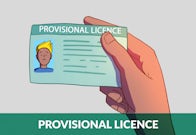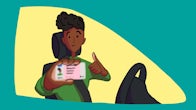

So you’ve decided it’s about time you learned how to drive. Learning to drive is a big deal, and you want to do it right, don’t you?
We want to help you become a safe and legal driver – so in this Ultimate Guide, we’ll cover everything you need to know about getting a provisional licence.
A DVLA Provisional Licence (Driver and Vehicle Licencing Agency), allows you to drive a car, motorbike or moped on the UK’s public roads before you have passed your driving test. It’s as simple as that. This is so you can gain some much-needed practice on the road, in the company of someone who knows what they’re doing.
If you’re riding a motorbike or moped, you can ride on your own to gain experience, but only on a motorcycle of 125cc or less. And, after completing the Compulsory Basic Training Course.
But if you’re learning to drive a car, you must be supervised by a driving instructor or someone over 21 years of age who has owned a Full Driving Licence for more than 3 years.
Finally, if you want to drive on your own, you must pass:

You can apply for a provisional licence if you satisfy the following requirements:
The UK government tells you the sequence of events you must follow on the route to becoming a qualified driver. Most people find it easy to do and can manage it with no difficulty.
Let’s look at these steps now and see if we can make it a bit easier for you to understand.
Once you’ve applied for your first provisional licence, you’ll receive an email from DVLA confirming your application. If you’ve applied online, you should receive your licence within a week or so.
Many people ask how much a provisional licence costs as it seems there is more than one advertised amount. Actually, there are two published prices depending on whether you apply online, by post, or at your post office.
At the time of writing, a provisional licence costs £34 if you apply and pay online by debit or credit card. Or, £43 if you apply by post or at a post office. The higher payment helps pay for the increased work involved in processing a manual application.
When applying for a provisional licence, don’t forget that you also need to provide:
Beware of any third party website that might fool you into paying extra for a licence. The site might even ask you to pay up to three times the official price. Often, these companies try to sell you ‘learner driver’s car insurance’ too.
Don’t be fooled. It’s a scam! Pay the official price for your licence at the Government approved outlets. It’s very simple to do and you’ll pay the absolute minimum price, every time. Any other company that advertises more or less than these amounts is trying to rip you off.
So, as you can see, ordinarily there’s no great rush to pass your test. But it’s better not to leave it until the last possible moment if you don’t want to start completing official forms all over again.
Unfortunately, you can’t take your theory or practical test if you don’t have your provisional licence. So, if you’ve lost it or it’s damaged, you must apply for a replacement (it will cost you £20 for that privilege).
Your replacement licence might take up to 15 days to arrive in the post, so re-apply as soon as you notice that it is missing. If you haven’t received it by the time of your test, you must cancel and set a new date. You do this by contacting the Driver and Vehicle Standards Agency as soon as possible and asking for a new date.
You must not drive on a motorway with a provisional licence unless you are in a dual control car with a DVSA (Driver and Vehicle Standards Agency) approved driving instructor.
But you will be able to:
There are certain exceptions and variations to the age rule:
If you are disabled and receive the mobility part of Personal Independence Payment (PIP), you can learn to drive and take a driving test when you’re 16 years old.
Remember, you cannot have driving lessons or take informal practice on the road until you have a licence. So don’t book anything until you have it in your hands.
However, it would be a shame to waste this valuable time. You can read and learn the rules of the road while you are waiting for your licence to arrive. Resources such as the Highway Code or Zutobi will help you massively along the way.
The Highway Code is an information booklet published by the UK Government. You can buy a copy online or from any high street book shop. It only costs a few pounds and it is well worth investing in one. You can carry it wherever you go and read a few pages whenever you have the time.
The Highway Code will teach the knowledge, but with no frills. Zutobi will help you out with their summarised version of the highway code and DVSA mock tests. Zutobi presents driving theory in a way that is easier to remember and understand.
We’re available on the web. And you can also find the Zutobi app on both the App Store or Google Play.
Congratulations! There are several things to do now that you have your licence:

Once you have your provisional driving licence, the UK Government says you must have some formal lessons as well as private practice.
Although you can practice with any experienced driver over the age of 21, you must only use a DVSA approved driving instructor for formal lessons. They are very skilled and extremely competent and can help you correct any bad driving habits you may have.
Furthermore, they usually know the local routes that examiners take when you have your test. This gives you valuable driving experience in many different road conditions similar to those that you’re likely to find when being examined. Also, using an approved instructor is the only way you can experience motorway driving.
Next thing you must do is to buy some ‘L Plates’ to fix at the front and the rear of your practice car. If you live in Wales, the plates have a letter ‘D’, but they mean the same thing. Your driving instructor will have them already fitted, so the extra set is for you to fix onto your vehicle for the private practice sessions.
Whatever you do, don’t forget motor insurance for those times when you aren’t with your instructor. If you intend gaining experience when supervised by a friend or family member, ensure they have at least third party insurance for a learner driver.
If you already own a car, you can buy some learner driver insurance from a motor vehicle insurance provider. Don’t be surprised if it’s expensive. In their eyes, a learner can be a high-risk driver, so you’ll probably pay more for the privilege. Don’t be tempted to drive without insurance, as it’s a serious offence and you could lose your licence.
You may not get enough driving practice from your formal instruction lessons alone unless you’ve got a really big budget, so try to ask friends and family to take you out on the road. You can drive on every public road except motorways as long as the supervising driver satisfies the legal requirements, you have motor insurance, and the car displays ‘L’ Plates.
Remember to record your private practice in different driving conditions to show your instructor.
The simple answer to this one is when your instructor believes you are good enough. You can go online and book your theory driving test through the Government website.
The theory test combines a multiple-choice test containing 50 questions, followed by a short break before tackling the hazard perception test.
Don’t panic, this isn’t as bad as it sounds. You should have no problems at all if you’ve been having lessons, practising your driving, reading the Highway Code, or using the Zutobi app.
Here are 3 things you should take to the venue on the day of your theory test.
You can then book your practical test once you’ve passed your theory test. For this, you need your licence number and the theory test pass certificate number. You also need to pay:
If you live in Northern Ireland the test will cost £45.50 on weekdays and £62.50 at weekends.
Some people wonder why they have to sit a practical test as well as a theory test. The reason is simple – you must show that you can handle a car and drive in many different road and traffic conditions without panicking. You must also prove that you have learned what you studied for the theory test.
The National Standard For Driving Cars And Light Vans tells you everything you need to know to be a safe and responsible driver. You should be very comfortable behind a steering wheel and know all the rules of the road before taking the driving test. Both of these are important, and the examiner will test you on certain aspects of both.
The examiner must be satisfied that you can drive the car. An exam makes everyone nervous, and the examiner will make allowances for this – but you have to prove that you can control the vehicle in all situations, including under stress.
The driving test is a test divided into several parts, the eyesight check, the basic safety check and the in-vehicle driving test.
Everything you need to know can be found in our practical driving test guide or on the UK Government website.
You can now exchange your provisional driving licence for a full licence. If all the details on your provisional licence are correct, the examiner will send your pass certificate to DVLA. Otherwise, you must do the job yourself.
Remember that you have to apply for your full licence within 2 weeks of taking your test or else you must take it again. You can start driving as soon as you’ve passed your test.
You should still regularly go back and refresh your knowledge even though you have a full license. After a few years behind the wheel, drivers often forget about safe driving practices and pick up bad driving habits. Refreshing your knowledge will help you stay a safe and responsible driver.
For example, typical dangerous mistakes include:
You could endanger your life and the lives of others if you drive recklessly. Mistakes like these happen because you think you know everything about driving and so cut corners (literally). You can prevent these mistakes and make roads safer for everyone by continuing to learn.
Don’t be embarrassed to let people know that you are training to improve your road skills. Everyone should keep up to date with changes in the traffic laws, and using the Zutobi app is one way to do it.

Alternatively, you could read the dull Highway Code once a year to make sure you still know the rules of the road. But let’s face it, that’s not something most drivers have the motivation to do – so I would place my bets on an alternative resource.

550+ exam-like questions
All you need to ace your test